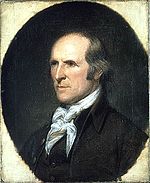Timothy Pickering, Date of Birth, Place of Birth, Date of Death
TweetTimothy Pickering
American statesman
 Date of Birth: 17-Jul-1745
Date of Birth: 17-Jul-1745
 Place of Birth: Salem, Massachusetts, United States
Place of Birth: Salem, Massachusetts, United States
Date of Death: 29-Jan-1829
Profession: military personnel, politician, diplomat
Nationality: United States
Zodiac Sign: Cancer 
About Timothy Pickering
- Timothy Pickering (July 17, 1745 – January 29, 1829) was a politician from Massachusetts who served in a variety of roles, most notably as the third United States Secretary of State under Presidents George Washington and John Adams.
- He also represented Massachusetts in both houses of Congress as a member of the Federalist Party. Born in Salem, Massachusetts, Pickering began a legal career after graduating from Harvard University.
- He won election to the Massachusetts General Court and served as a county judge.
- He also became an officer in the colonial militia and served in the Siege of Boston during the early stages of the American Revolutionary War.
- Later in the war, he was Adjutant General and Quartermaster General of the Continental Army.
- After the war, Pickering moved to the Wyoming Valley of Pennsylvania and took part in the then colony's 1787 ratifying convention for the United States Constitution. President Washington appointed Pickering to the position of Postmaster General in 1791.
- After briefly serving as Secretary of War, Pickering became the Secretary of State in 1795, and remained in that office after President Adams was inaugurated.
- As Secretary of State, Pickering favored close relations with Britain.
- President Adams dismissed him in 1800 due to Pickering's opposition to peace with France during the Quasi-War. Pickering won election to represent Massachusetts in the United States Senate in 1803, becoming an ardent opponent of the Embargo Act of 1807.
- He continued to support Britain in the Napoleonic Wars, famously describing the country as "The World's last hope – Britain's Fast-anchored Isle." He left the Senate in 1811 but served in the United States House of Representatives from 1813 to 1817.
- During the War of 1812 he became a leader of the New England secession movement and helped organize the Hartford Convention.
- The fallout from the convention ended Pickering's political career.
- He lived as a farmer in Salem until his death in 1829.
Read more at Wikipedia
See Also
- Famous People's Birthdays on 17 July, United States
- Famous People's Birthdays in July, United States
- Famous military personnel's Birthdays on 17 July, United States
- Famous military personnel's Birthdays in July, United States
- Famous politician's Birthdays on 17 July, United States
- Famous politician's Birthdays in July, United States
- Famous diplomat's Birthdays on 17 July, United States
- Famous diplomat's Birthdays in July, United States


